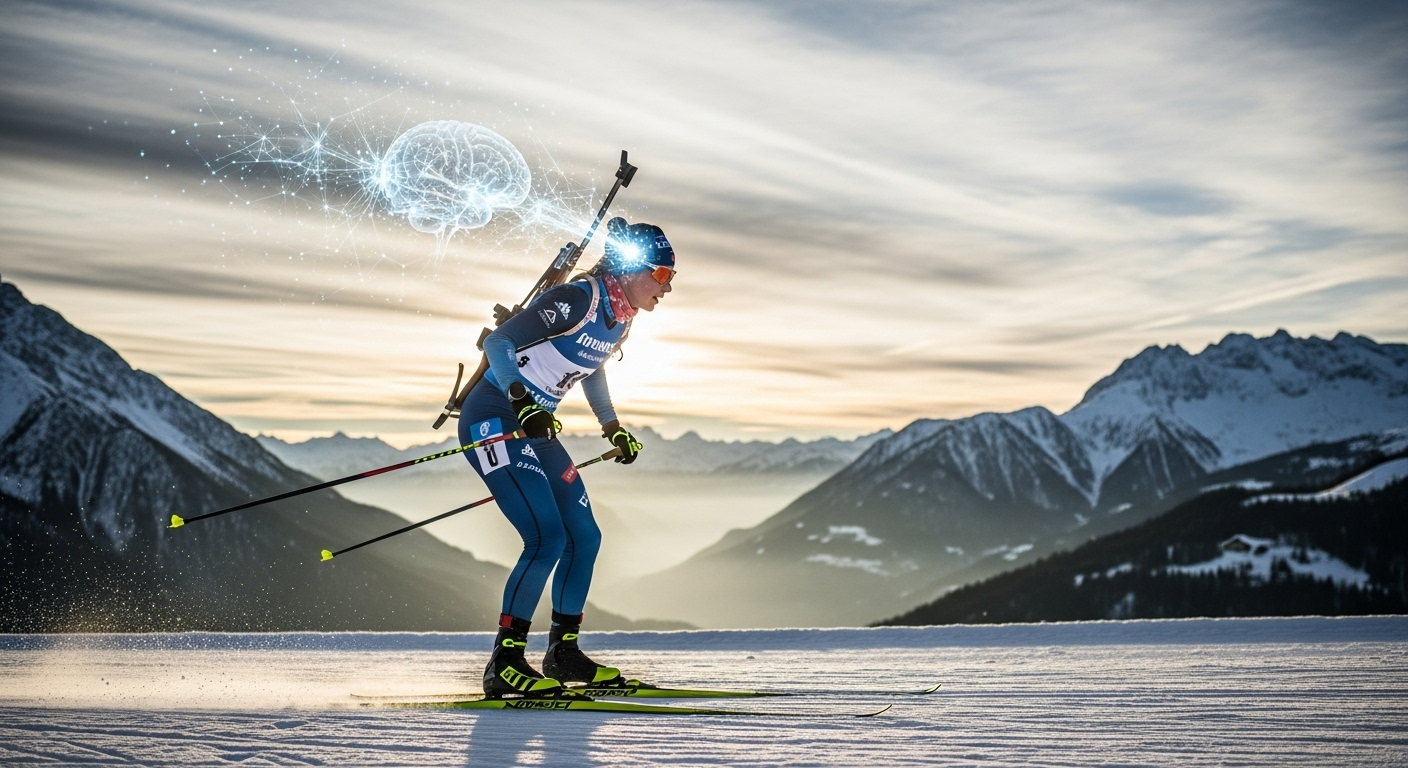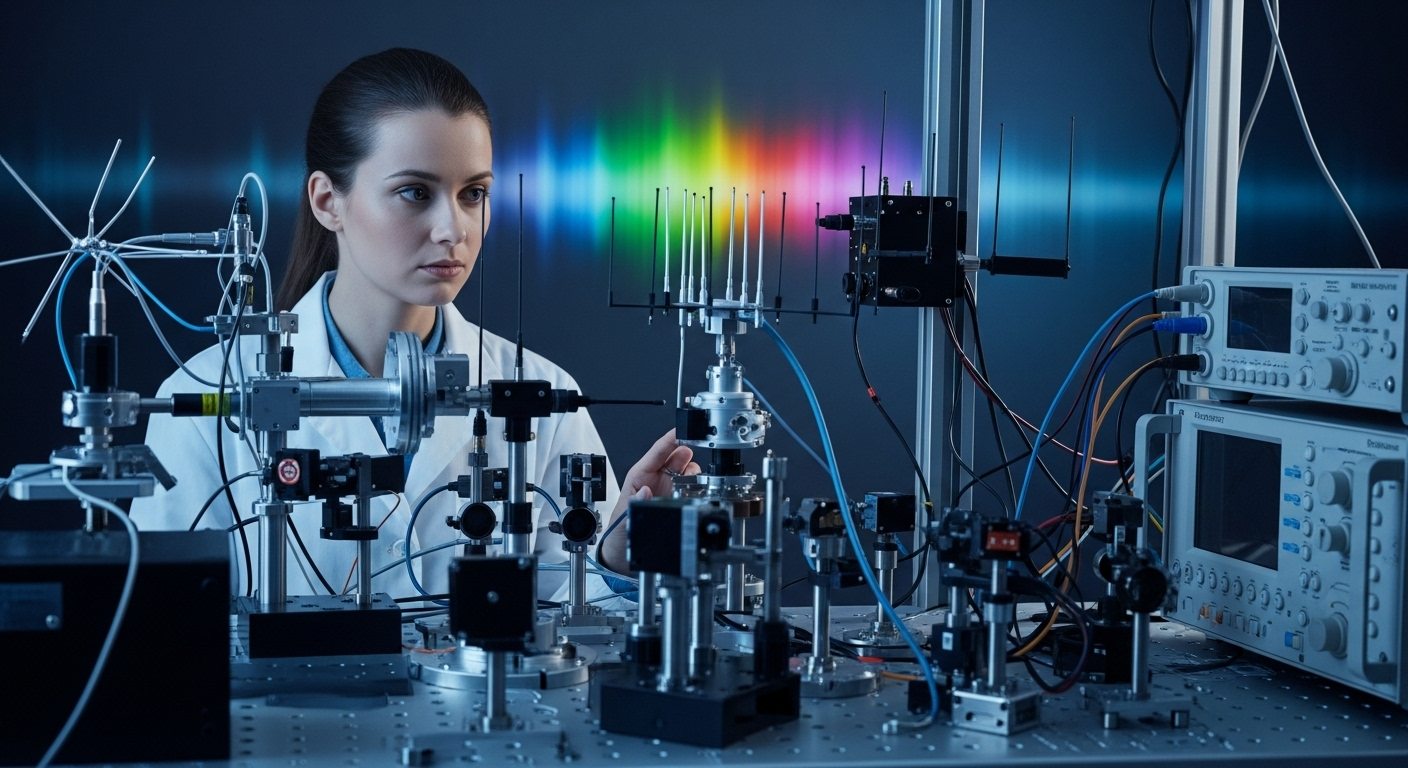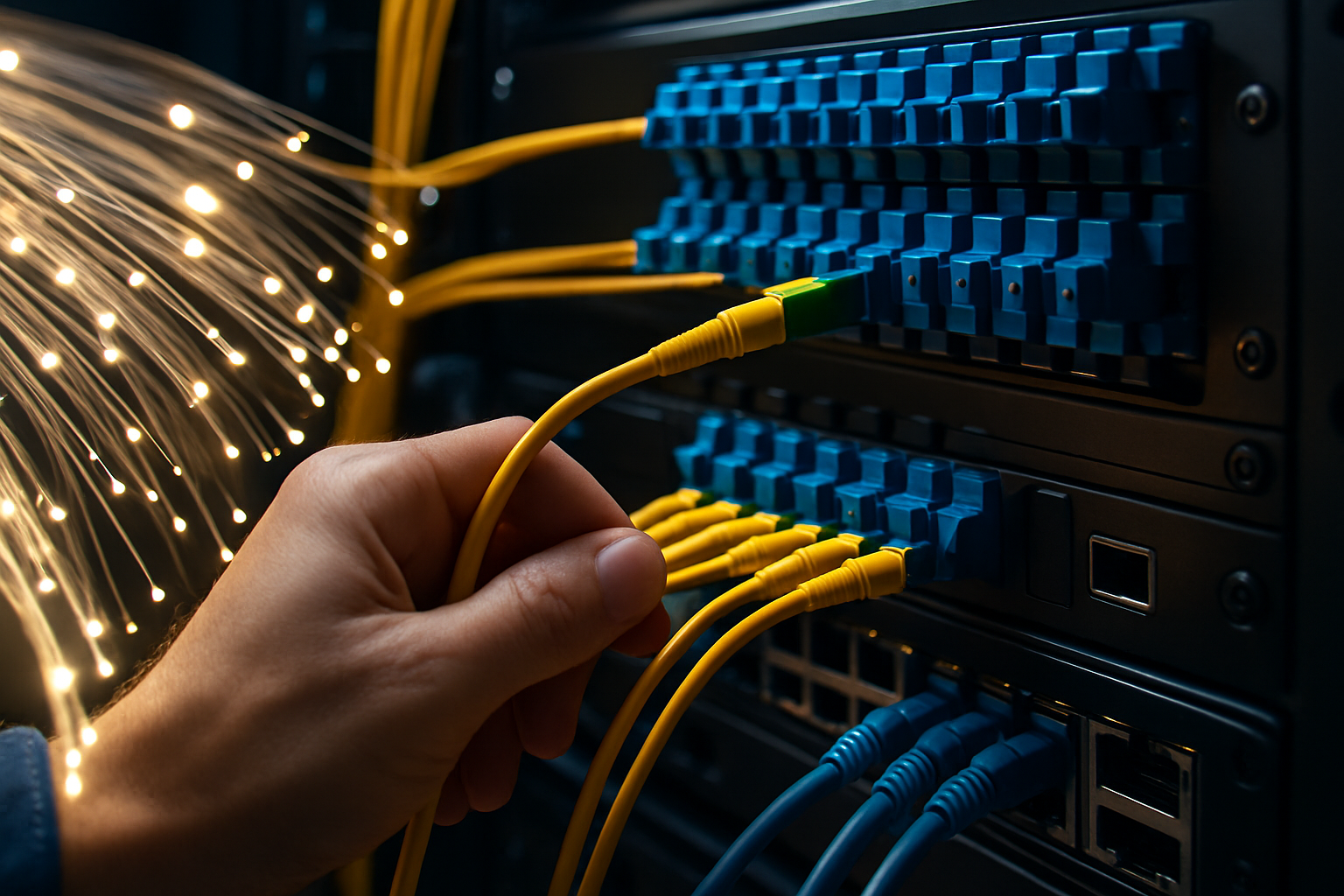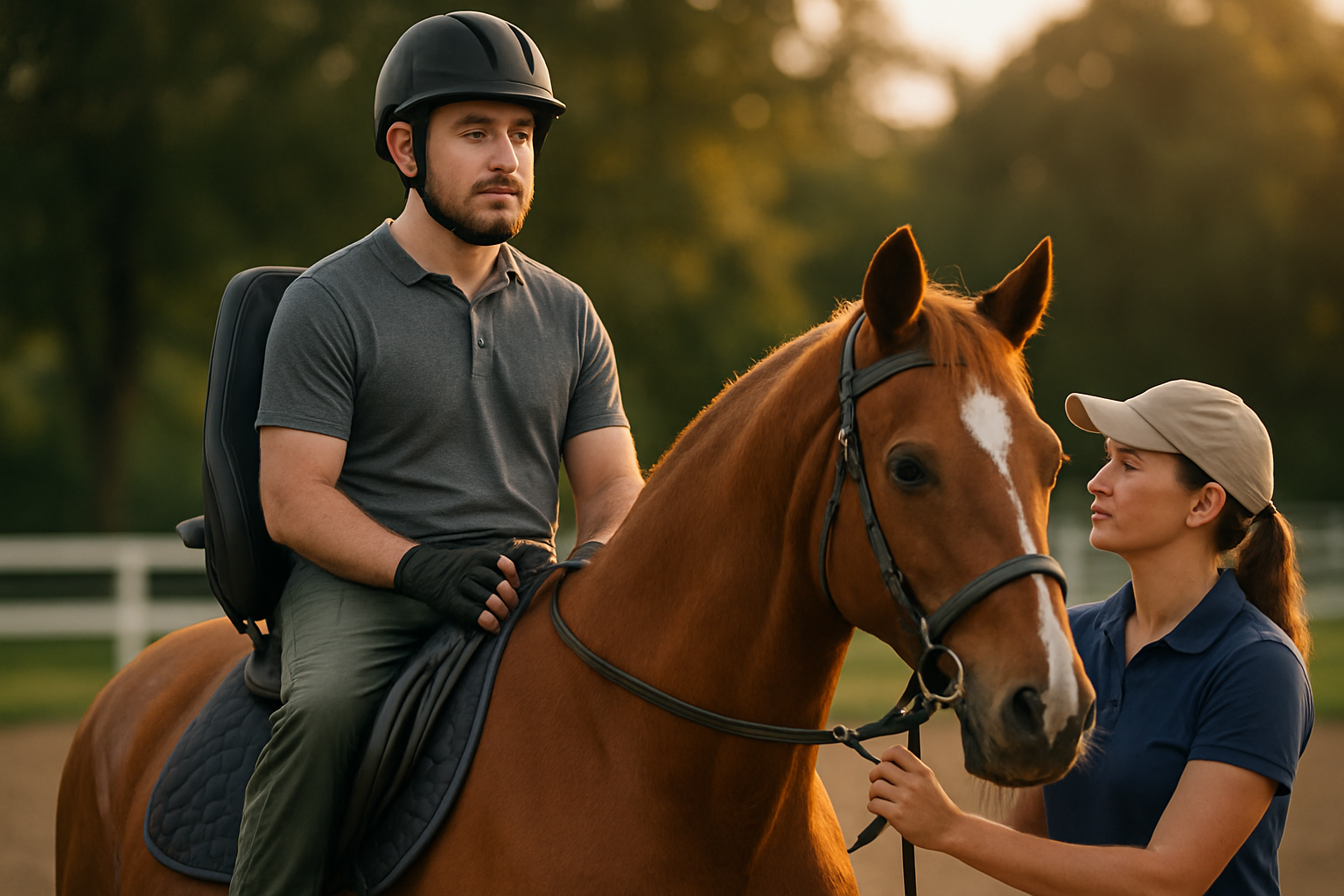Biathlete's Brain: Mastering the Mind-Body Connection
Biathlon stands as a testament to the incredible versatility of the human body and mind. This winter sport, combining cross-country skiing with precision rifle shooting, demands an unparalleled fusion of physical endurance and mental acuity. Athletes must navigate challenging terrain at breakneck speeds, only to suddenly transition to a state of absolute stillness and focus for shooting. This rapid shift between intense cardiovascular activity and pinpoint accuracy presents a unique physiological and psychological challenge that sets biathlon apart from other sports.

This physiological balancing act is further complicated by the effects of intense exercise on vision and fine motor control. As heart rate soars and breathing becomes labored, visual acuity can decrease, and muscle tremors may increase. Elite biathletes develop strategies to counteract these effects, such as specific breathing techniques and mental visualization exercises that help stabilize their shooting platform.
Mental Fortitude: The Cornerstone of Biathlon Success
While the physical demands of biathlon are undeniable, it is perhaps the mental aspect of the sport that truly sets champions apart. The ability to maintain focus and make split-second decisions under extreme physiological stress is crucial. Biathletes must constantly assess and adjust their performance in real-time, factoring in variables such as wind speed, temperature, and their own fatigue levels.
Moreover, the psychological pressure of competition adds another layer of complexity. A single missed shot can mean the difference between victory and defeat, requiring athletes to develop exceptional emotional regulation and resilience. Many top biathletes incorporate mindfulness and meditation practices into their training regimens, honing their ability to stay present and composed regardless of external circumstances.
Training the Biathlete’s Brain
The unique demands of biathlon have led to innovative training methodologies that target both physical conditioning and cognitive performance. Beyond traditional endurance and marksmanship training, many athletes now incorporate neurofeedback and cognitive training exercises into their routines. These techniques aim to enhance attention, working memory, and cognitive flexibility—all critical components of successful biathlon performance.
One emerging area of focus is the use of virtual reality (VR) technology in biathlon training. VR simulations allow athletes to practice the rapid transition between skiing and shooting in a controlled environment, helping to refine their mental switching abilities and decision-making skills. This technology also enables coaches to manipulate variables such as course difficulty and weather conditions, providing a more comprehensive and adaptable training experience.
The Role of Technology in Biathlon Performance
As with many modern sports, technology plays an increasingly significant role in biathlon performance and training. Advanced biofeedback systems now allow athletes and coaches to monitor physiological markers such as heart rate variability, respiration patterns, and even brain wave activity in real-time. This data provides invaluable insights into an athlete’s physical and mental state, enabling more targeted and effective training interventions.
In competition, cutting-edge rifle technology and ammunition have pushed the boundaries of shooting accuracy. However, it’s the integration of this technology with the athlete’s own capabilities that truly defines modern biathlon. The most successful competitors are those who can seamlessly blend their human skills with technological advantages, creating a synergy that maximizes performance under the most demanding conditions.
The Future of Biathlon: Pushing Human Limits
As our understanding of the mind-body connection in biathlon continues to evolve, so too does the potential for human performance in this unique sport. Researchers are exploring new frontiers in cognitive enhancement, including the use of non-invasive brain stimulation techniques to improve focus and mental stamina. While such approaches raise ethical questions about the nature of athletic performance, they also highlight the fascinating interplay between technology, physiology, and psychology in pushing the boundaries of human achievement.
The future of biathlon may also see a greater emphasis on personalized training and competition strategies based on individual cognitive and physiological profiles. By leveraging advances in genetic testing and personalized medicine, athletes and coaches may be able to tailor training programs to optimize performance based on an individual’s unique neurobiological makeup.
Lessons from Biathlon: Applications Beyond Sport
The insights gained from studying the mind-body connection in biathlon have implications that extend far beyond the realm of sport. The techniques developed by biathletes for rapid stress regulation and cognitive flexibility have potential applications in high-stress professions such as emergency services, military operations, and even corporate leadership.
Moreover, the biathlete’s ability to maintain focus and make critical decisions under physiological duress offers valuable lessons for anyone seeking to improve their performance under pressure. The mental training strategies employed by these athletes—from visualization techniques to mindfulness practices—can be adapted to enhance cognitive performance in various life situations.
The Psychological Edge: Mental Toughness in Biathlon
One of the most fascinating aspects of biathlon is the psychological resilience required to excel in the sport. The ability to maintain composure and focus in the face of extreme physical exertion and high-stakes competition is a hallmark of elite biathletes. This mental toughness is not merely an innate trait but a skill that is cultivated through years of dedicated training and experience.
Central to this psychological edge is the concept of emotional regulation. Biathletes must learn to manage their emotional responses to both success and failure during a race. A missed shot or a slow skiing section can quickly derail an athlete’s performance if they allow frustration or disappointment to take hold. Conversely, the elation of a perfect shooting round must be quickly tempered to maintain focus on the remaining challenges.
To develop this emotional control, many biathletes incorporate various psychological techniques into their training regimens. Cognitive restructuring, a method of identifying and challenging negative thought patterns, is often used to help athletes maintain a positive and focused mindset. Similarly, visualization exercises allow biathletes to mentally rehearse their performance, reinforcing positive outcomes and preparing for potential challenges.
The Science of Breathing in Biathlon
Breath control is a critical component of biathlon performance, particularly during the shooting portions of the race. The rapid transition from high-intensity skiing to precise marksmanship requires a quick and effective modulation of breathing patterns. This process is not just about slowing down respiration; it involves a complex interplay between the respiratory, cardiovascular, and nervous systems.
Research has shown that elite biathletes develop a unique breathing strategy that allows them to stabilize their body and optimize oxygenation in the brief moments before taking a shot. This typically involves a series of deep, rhythmic breaths followed by a hold at a specific point in the respiratory cycle. This technique helps to minimize body movement, reduce heart rate, and enhance focus.
The science behind this breathing strategy is rooted in the concept of respiratory sinus arrhythmia (RSA), the natural variation in heart rate that occurs during the breathing cycle. By manipulating their breathing, biathletes can effectively “hack” their RSA to induce a state of physiological calm, even in the midst of intense physical exertion.
Advanced monitoring technologies now allow researchers and coaches to analyze an athlete’s breathing patterns in real-time, providing valuable feedback for refining this crucial skill. Some training programs have begun to incorporate biofeedback devices that help athletes visualize and control their physiological state, further enhancing their ability to optimize performance through breath control.
Nutritional Strategies for Cognitive Performance in Biathlon
The role of nutrition in biathlon extends beyond mere fueling for physical endurance. Emerging research suggests that specific nutritional strategies can enhance cognitive performance and mental stamina—critical factors in biathlon success. This has led to a more nuanced approach to nutrition among elite biathletes, with a focus on foods and supplements that support both physical and mental performance.
One area of particular interest is the role of omega-3 fatty acids in cognitive function. These essential fats, found in foods like fatty fish and flaxseeds, are crucial for brain health and have been linked to improvements in attention, processing speed, and executive function. Many biathletes now incorporate omega-3-rich foods or supplements into their dietary regimens to support optimal brain function during training and competition.
Similarly, the timing and composition of pre-competition meals are carefully considered to optimize both physical energy and mental acuity. Complex carbohydrates are typically favored for sustained energy release, while some athletes incorporate moderate amounts of caffeine to enhance alertness and focus. However, the key is finding the right balance, as too much caffeine can lead to jitters and impair fine motor control—a critical consideration for accurate shooting.
Hydration also plays a crucial role in cognitive performance, with even mild dehydration shown to impair attention and decision-making skills. Biathletes must carefully manage their fluid intake before and during competitions, balancing the need for hydration with the practical considerations of the sport.
The Social Psychology of Biathlon Teams
While biathlon is often perceived as an individual sport, the role of team dynamics in performance cannot be overstated. Many biathletes compete as part of national or professional teams, and the social and psychological aspects of these group environments can significantly impact individual performance.
Research in sports psychology has highlighted the importance of team cohesion and shared mental models in enhancing both individual and collective performance. In biathlon, this translates to a shared understanding of race strategies, support systems during training and competition, and a collective resilience in the face of challenges.
The concept of “shared suffering” is particularly relevant in biathlon, where athletes undergo grueling training regimens and face extreme physical and mental challenges together. This shared experience can foster a deep sense of camaraderie and mutual support, which in turn can enhance individual motivation and performance.
Moreover, the presence of teammates can serve as a powerful motivational force during competition. The knowledge that one’s performance contributes to a larger team goal can provide an extra push during difficult moments in a race. Conversely, the pressure of not letting teammates down can be a significant source of stress that athletes must learn to manage.
Biathlon and Neuroplasticity: Rewiring the Brain for Performance
The intense and multifaceted nature of biathlon training appears to have significant effects on brain structure and function, offering a fascinating glimpse into the brain’s adaptability. Neuroimaging studies of elite biathletes have revealed structural and functional changes in areas of the brain associated with motor control, attention, and emotional regulation.
One particularly interesting finding is the enhanced connectivity between the prefrontal cortex and the amygdala observed in experienced biathletes. This increased neural communication is thought to underlie the superior emotional regulation capabilities that are crucial for maintaining focus and performance under pressure.
Additionally, the repeated practice of rapidly switching between high-intensity physical activity and precise, controlled movements appears to enhance cognitive flexibility. This is reflected in improved performance on tasks requiring quick shifts of attention and motor control, even outside the context of the sport.
These neuroplastic changes highlight the profound impact that dedicated biathlon training can have on the brain. They also suggest potential applications for cognitive training in other domains, where the ability to maintain focus and make rapid, accurate decisions under stress is paramount.
The Role of Sleep in Biathlon Performance
The importance of sleep in athletic performance is well-established, but its role in biathlon deserves special consideration given the sport’s unique cognitive demands. Quality sleep is crucial not only for physical recovery but also for consolidating the motor skills and decision-making processes that are essential to biathlon success.
Research has shown that sleep deprivation can have significant negative impacts on both physical endurance and cognitive function, including impaired attention, slower reaction times, and decreased accuracy. For biathletes, who must maintain peak physical and mental performance throughout a competition, even small decrements in these areas can have profound effects on overall results.
Many elite biathletes now incorporate sophisticated sleep monitoring and management strategies into their training regimens. This may include using wearable devices to track sleep quality and quantity, implementing strict sleep hygiene practices, and even working with sleep specialists to optimize their rest and recovery.
Moreover, the challenge of maintaining healthy sleep patterns is compounded by the travel demands of international competition and the need to adapt to different time zones. Strategies for managing jet lag and quickly adapting to new sleep-wake cycles have become an essential part of many biathletes’ competition preparation.
Biathlon as a Model for Cognitive-Physical Integration
The unique demands of biathlon offer a compelling model for studying the integration of cognitive and physical performance. The sport requires a level of mind-body coordination that is rarely seen in other athletic disciplines, making it a fertile ground for research into human performance optimization.
Insights gained from studying biathlon performance have potential applications in various fields, from enhancing military and law enforcement training to improving rehabilitation strategies for individuals recovering from brain injuries. The techniques developed by biathletes for rapidly modulating physiological and cognitive states could inform new approaches to stress management and performance enhancement in high-pressure professions.
Furthermore, the holistic approach to training employed in biathlon—encompassing physical conditioning, mental preparation, technological integration, and nutritional strategies—offers a blueprint for comprehensive performance optimization that could be adapted to various domains of human endeavor.
Ethical Considerations in Biathlon Performance Enhancement
As our understanding of the physiological and cognitive factors underlying biathlon performance continues to advance, important ethical questions arise regarding the boundaries of performance enhancement. The use of cognitive training techniques, advanced technologies, and potentially even pharmacological interventions to improve mental function raises complex issues about fairness and the nature of athletic achievement.
Where do we draw the line between legitimate training and unfair advantage? How do we balance the pursuit of human potential with the need to maintain a level playing field? These questions are not unique to biathlon, but the sport’s emphasis on both physical and mental performance brings them into sharp focus.
The biathlon community, like many in the world of elite sports, must grapple with these ethical dilemmas as technology and scientific understanding continue to evolve. Striking the right balance between embracing innovation and preserving the integrity of the sport will be crucial for the future of biathlon and may offer valuable lessons for other domains facing similar challenges.
The Ongoing Evolution of Biathlon
As we look to the future, it’s clear that biathlon will continue to evolve, pushing the boundaries of human physical and mental performance. The integration of cutting-edge technology, advanced training methodologies, and deepening scientific understanding of the mind-body connection promises to take the sport to new heights.
Yet, at its core, biathlon remains a profound test of human capability—a unique challenge that demands the utmost in physical endurance, mental fortitude, and precise skill. It is this fundamental human element, the striving to master both body and mind in the face of extreme challenges, that continues to captivate athletes and spectators alike.
The lessons learned from biathlon extend far beyond the snow-covered trails and shooting ranges. They offer insights into the remarkable plasticity of the human brain, the intricate dance between physical and mental states, and the incredible potential for human performance when body and mind work in perfect harmony. As we continue to unravel the mysteries of the biathlete’s brain, we gain not only a deeper appreciation for this demanding sport but also valuable knowledge that can enhance human performance across a wide spectrum of endeavors.






